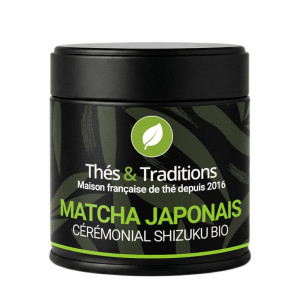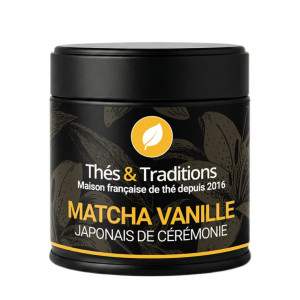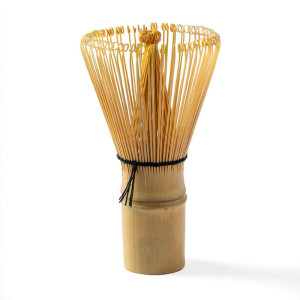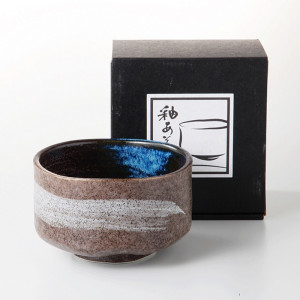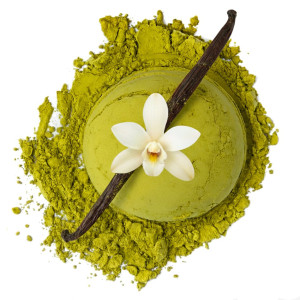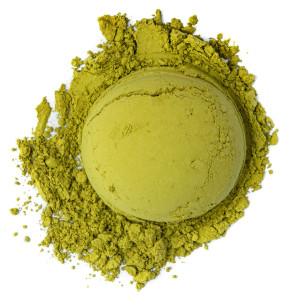The Complete Guide to Matcha: Everything About Japanese Green Tea Powder
Matcha, this Japanese green tea powder of a bright green, fascinates as much as it intrigues. Much more than just a trendy beverage, this thousand-year-old treasure of Japan hides an extraordinary cultural and gustatory richness. Between ancestral tradition and modernity, matcha now stands as a must-have for all tea and wellness enthusiasts.
Sommaire du guide
Discovering matcha means diving into a universe where every gesture counts, where quality takes precedence over quantity, and where each cup tells a story. Whether you're a curious novice or an enlightened enthusiast, this guide accompanies you in your exploration of this exceptional tea, from its origins to its preparation, through its benefits and multiple uses.
Key takeaways
- Authentic matcha comes exclusively from Japan and is distinguished by its intense jade green color
- Its traditional preparation requires specific accessories: bowl (chawan), bamboo whisk (chasen), and spoon (chashaku)
- Its benefits include a high concentration of antioxidants, a sustained energy boost, and relaxing properties
- Its versatility allows it to be used as a traditional beverage, modern latte, or in pastry
- Quality varies by grade: ceremonial for pure tasting, culinary for cooking
What exactly is matcha?
Matcha (抹茶, literally "powdered tea") represents the culmination of centuries of refinement in the art of Japanese tea. Unlike classic green teas that are steeped, matcha is consumed entirely: you literally drink the tea leaves reduced to ultra-fine powder.
This particularity changes everything. Where a classic infusion captures only part of the nutrients from the leaves, matcha offers you all of their benefits. It's like comparing freshly squeezed orange juice to a whole blended fruit: the nutritional intensity is nothing alike.
Matcha production follows a unique process. Four weeks before harvest, the tea plants are covered with tarps to deprive them of light. This technique, called "shading", forces the plant to produce more chlorophyll and amino acids, particularly L-theanine. The result: that characteristic jade-green color and distinctive umami taste.
After harvest, only the most tender leaves are selected. They are steamed to stop oxidation, dried, then stripped of their veins and stems. What remains, called "tencha," is then ground between stone mills for hours to obtain this powder of extraordinary fineness.
The fascinating origins of matcha tea
The history of matcha begins in China, in the 8th century, with the first powdered teas. But it's in Japan that this tradition will truly flourish and transform into a way of life.
In 1191, Buddhist monk Eisai brought tea from China and planted the first seeds in the mountains of Kyoto. He quickly discovered the meditative virtues of this beverage: the L-theanine it contains promotes concentration while calming the mind. Perfect for long meditation sessions!
It was in the 16th century that Sen no Rikyū, legendary tea master, codified the tea ceremony (chanoyu) as we know it today. Each gesture becomes symbolic, each utensil has its purpose. Matcha is no longer just a beverage, it becomes the heart of a philosophy of life advocating simplicity, respect, and harmony.
For centuries, matcha remained the prerogative of the aristocracy and monks. It took the modern era for it to become democratized, first in Japan, then worldwide. Today, from Tokyo to Paris via New York, matcha conquers the most demanding palates.
How to recognize quality matcha?
Not all matchas are created equal, far from it. Learning to distinguish exceptional matcha from an ordinary product ensures a taste experience that meets your expectations.
Color reveals everything. Ceremonial-grade matcha displays a bright jade green, almost fluorescent. If your powder leans toward yellow or brown, it's a bad sign: either it was poorly stored or it comes from lower-quality leaves.
The fineness of the powder is another crucial indicator. Real matcha should be as fine as talcum powder. Rub a little between your fingers: it should be silky, without any perceptible grains. This fineness results from traditional stone mill grinding, a long and costly process that industrial producers often avoid.
Geographic origin matters enormously. The regions of Uji (near Kyoto), Nishio (Aichi prefecture), and Kagoshima produce the best matchas. Beware of products without origin indication or from countries other than Japan.
Price remains a reliable indicator. Quality ceremonial matcha costs between 30 and 100 euros for 30 grams. Below 20 euros, you risk being disappointed. Certainly, it's an investment, but relative to the number of cups (about 15 to 20), the cost remains reasonable for an exceptional product.
Packaging must protect the powder from light and air. Choose opaque, airtight containers. Absolutely avoid transparent bags: matcha quickly loses its qualities in them.
The different grades of matcha
The world of matcha is divided into several categories, each with its specificities and uses. Understanding these distinctions will help you choose the right product according to your needs.
Ceremonial matcha represents the pinnacle of quality. Produced exclusively from the first leaves of the harvest, it's meant for pure tasting, prepared according to the traditional method. Its complex taste blends sweetness, subtle bitterness, and umami notes. It's the connoisseur's matcha, the one you savor slowly, in full mindfulness.
Premium matcha offers an excellent quality-price compromise. Slightly less refined than ceremonial grade, it's perfectly suited for preparing lattes or mixed beverages. Its flavor remains delicate, with a more pronounced but still balanced bitterness.
Culinary matcha is intended for cooking and pastry. More robust in taste and less expensive, it withstands cooking and mixing with other ingredients well. It's the one used for cakes, ice creams, chocolates, or smoothies.
Beware of misleading labels! Some sellers use terms like "premium culinary matcha" to suggest superior quality. Real culinary matcha owns its status and price accordingly.
Traditional matcha preparation
Preparing matcha according to Japanese tradition means participating in an ancient ritual where each gesture has its importance. This method, far from being complicated, simply requires a bit of patience and the right accessories.
Essential utensils form the magic trio of matcha. The chawan (tea bowl) offers the necessary space to whisk effectively. Its flared shape and material (ceramic or bamboo) influence temperature and taste. The chasen (bamboo whisk) with its multiple prongs creates that characteristic foam. Finally, the chashaku (bamboo spoon) precisely measures the powder.
The preparation technique follows precise steps. Start by heating your bowl with hot water, then dry it. Sift 1 to 2 grams of matcha (about 2 chashaku) directly into the bowl to eliminate lumps. Pour 60 ml of water at 70-80°C - never boiling, it would burn the delicate aromas of matcha.
Whisking is the crucial step. Hold the chasen firmly and whisk vigorously forming an "M" or "W". Avoid circular movements that would break the whisk prongs. After 15 to 20 seconds, a beautiful jade green foam should form on the surface.
Tasting is done immediately. Hold the bowl with both hands, breathe in the aromas, then drink in small sips. Matcha is consumed hot, in 3 to 4 sips maximum. This concentration allows you to fully appreciate the gustatory complexity.
The exceptional benefits of matcha
Matcha is more than a delicious beverage: it's a true concentrate of health benefits. Its exceptional nutritional richness makes it a valuable ally for your daily well-being.
Antioxidants constitute matcha's main strength. With a catechin concentration 137 times higher than that of classic green tea, it breaks all records. These molecules protect your cells from oxidative stress, slow aging, and strengthen your immune system.
The sustained energy that matcha provides differs completely from that of coffee. L-theanine, an amino acid unique to tea, modulates caffeine absorption. Result: a gradual energy boost that lasts 4 to 6 hours, without peaks or sudden crashes. No more 11 a.m. slumps!
Mental concentration improves thanks to this same L-theanine. It promotes the production of alpha waves in the brain, the same waves present during meditation. You remain alert but relaxed, focused but serene. Buddhist monks understood this well!
Metabolism also benefits from matcha. Catechins, particularly EGCG, stimulate thermogenesis and can help maintain a healthy weight. Of course, matcha isn't a magic potion, but it can effectively accompany a balanced lifestyle.
Detoxification is activated thanks to abundant chlorophyll. This molecule helps the liver eliminate toxins and heavy metals. The intense green color of matcha testifies to this richness in chlorophyll.
Matcha in modern cuisine
Matcha has conquered kitchens around the world, bringing its unique color and distinctive flavor to countless culinary creations. This versatility makes it an ingredient of choice for creative chefs.
In pastry, matcha revolutionizes classic desserts. Macarons, tiramisu, cheesecake, chocolates... Its grassy and slightly bitter flavor perfectly balances the sweetness of sweet preparations. The secret? Use quality culinary matcha and dose sparingly: 1 to 2 teaspoons are enough for 500g of preparation.
Modern beverages have enthusiastically adopted matcha. The matcha latte, prepared with plant-based or dairy milk, democratizes this ancestral drink. Green smoothies gain flavor and nutrients with a touch of matcha. Even cocktails are getting in on it: fancy a matcha martini?
Savory cuisine timidly but surely explores matcha's possibilities. Vinaigrettes, fish marinades, vegetable seasonings... Its natural umami subtly enriches dishes without overpowering them. The trick: incorporate it at the end of cooking to preserve its delicate aromas.
Ice creams and sorbets with matcha are all the rage, especially in summer. This refreshing and original flavor appeals even to the most conservative palates. Combined with vanilla or white chocolate, matcha creates surprising taste harmonies.
How to properly store your matcha
Matcha, a delicate product par excellence, requires special precautions to preserve all its qualities. Poor storage can transform exceptional matcha into bland, yellowish powder.
The number one enemy of matcha is oxidation. In contact with air, the powder quickly loses its bright color and subtle aromas. Once opened, your matcha must be consumed within 3 to 4 weeks maximum. Past this period, even well preserved, it will have lost a large part of its qualities.
Ideal storage combines several conditions. Cool temperature (ideally in the refrigerator), absence of light, protection against humidity and air. Transfer your matcha to an opaque airtight container upon opening. Metal boxes with sealing gaskets are perfect.
Mistakes to avoid are numerous. Never leave your matcha at room temperature after opening. Avoid transparent containers, even airtight ones. Don't store your matcha near fragrant foods: it easily absorbs surrounding odors.
The freshness test is simple: fresh matcha should have an intense jade green color and a pleasant grassy smell. If the powder leans toward yellow or gives off a hay smell, it has lost its qualities.
Matcha vs other green teas: the differences
Although all derived from the same plant (Camellia sinensis), matcha and other green teas present fundamental differences that justify their special status.
The cultivation method immediately distinguishes matcha. This shading of 3 to 4 weeks before harvest, unique to matcha and gyokuro, completely transforms the composition of the leaves. Tea plants produce more chlorophyll and amino acids, less tannins. Hence this very particular color and this smoothness in the mouth.
Transformation differs radically. Where classic green teas keep their leaf form, matcha undergoes complete grinding. This pulverization releases all active compounds, multiplying nutritional intensity. It's the difference between biting into a whole apple and drinking juice: the impact isn't the same.
Preparation contrasts two philosophies. Green teas are steeped: we extract some of their compounds in hot water. Matcha is mixed: we consume the transformed leaf entirely. This difference explains why a cup of matcha contains 10 times more antioxidants than a classic green tea.
Taste reveals distinct universes. A sencha or gyokuro develops fresh, grassy, sometimes iodized notes. Matcha offers a more complex palette: creamy sweetness, noble bitterness, pronounced umami. This gustatory richness justifies its pure tasting, without additions.
Price reflects this production complexity. Where an excellent sencha costs 20 to 40 euros per 100g, ceremonial matcha easily reaches 100 euros per 30g. This difference is explained by the intensive labor and low yields of matcha.
Common mistakes to avoid
Discovering matcha can hold a few surprises for the uninitiated. Avoiding these common pitfalls guarantees a successful experience from your very first attempts.
Water that's too hot is the most common mistake. Many apply black tea rules to matcha and pour boiling water. Big mistake! At 100°C, you destroy the delicate aromas and accentuate the bitterness. Respect the 70-80°C maximum.
Overdosing often discourages beginners. Two grams of matcha is more than enough for one cup. Beyond that, bitterness dominates and masks the flavor complexity. Start with even 1 gram if you're discovering it: you can always gradually increase.
Insufficient whisking produces an unpleasant grainy beverage. Take the time to whisk vigorously for 15 to 20 seconds. The foam that forms isn't just aesthetic: it reveals that the particles are properly suspended.
Impulse buying often leads to disappointment. Resist attractive offers of "premium matcha" at 10 euros per 100g. Real quality matcha has a price, certainly high, but justified. Better to invest in 30g of excellent matcha than in 100g of disappointing powder.
Neglected storage ruins even the best matchas. Upon opening, transfer your powder to an airtight container and place it in the refrigerator. This simple precaution preserves quality and flavor for several weeks.
Where to buy good matcha?
Finding quality matcha requires a bit of research, but good addresses exist. Here's how to find hidden gems without breaking the bank.
Tea specialists remain your best bet. These shops, physical or online, rigorously select their products and can advise you according to your tastes and budget. Their sellers generally know their products well and will know how to guide you.
Japanese grocery stores often offer excellent matchas at reasonable prices. The advantage: you'll also find traditional accessories there (chasen, chawan, chashaku) often sold in kits. The downside: selection remains limited and advice sometimes scarce.
The internet offers the widest choice, but requires vigilance. Favor specialized sites with real product descriptions, detailed photos, and customer reviews. Beware of general marketplaces where quality varies enormously.
Selection criteria remain constant regardless of the channel. Clearly indicated Japanese origin, specified grade (ceremonial, premium, culinary), airtight packaging, price consistent with the announced quality. Don't hesitate to start with small quantities to test.
Recommended brands include references like Ippodo, Marukyu Koyamaen, or Aiya for purists. For beginners, brands like Kumiko Matcha or Anatae offer excellent quality-price ratios.
Ready for the matcha adventure?
Matcha is more than just a beverage: it's an invitation to travel, a pause in our hectic daily lives, a moment of connection with an ancient tradition. Whether you choose the traditional path of the tea ceremony or the modern approach of matcha latte, the essential remains the same: taking the time to savor.
Start simply. Premium matcha, a few basic accessories, and there you have it: you have everything to discover this fascinating world. Don't be afraid to experiment, make mistakes, adjust. Each cup will teach you something new.
Matcha awaits you. All that's left is to take the plunge and let this green powder transform your tea breaks into exceptional moments. After all, in a world that's always moving faster, isn't offering yourself a few minutes of serenity with a bowl of matcha a luxury accessible to all?
Frequently asked questions about matcha
Does matcha contain more caffeine than coffee?
No, matcha contains about 70mg of caffeine per cup versus 95mg for coffee. But thanks to L-theanine, this caffeine is released gradually, offering a more lasting energizing effect without jitters.
Can you drink matcha every day?
Absolutely! One to two cups a day are even recommended to fully enjoy its benefits. Just avoid consuming it in the evening if you're sensitive to caffeine.
Why is my matcha bitter?
Excessive bitterness usually comes from water that's too hot (over 80°C) or using too much powder. Respect the temperature and start with 1 gram of powder to get used to the taste.
Does matcha help with weight loss?
Matcha can support a healthy metabolism thanks to its catechins, but it's not a miracle weight-loss product. It fits perfectly into a balanced diet and an active lifestyle.
How can I tell if my matcha has gone bad?
Expired matcha loses its vibrant green color (it turns yellow or brown) and develops a hay-like odor. Its flavor becomes bland and unpleasant. Good matcha should retain its jade color and fresh, herbaceous aroma.
Can you prepare matcha with milk?
Traditionally no, but nothing stops you from creating matcha lattes! Use culinary matcha for these preparations instead, less expensive and with a more robust taste that better withstands mixing.
